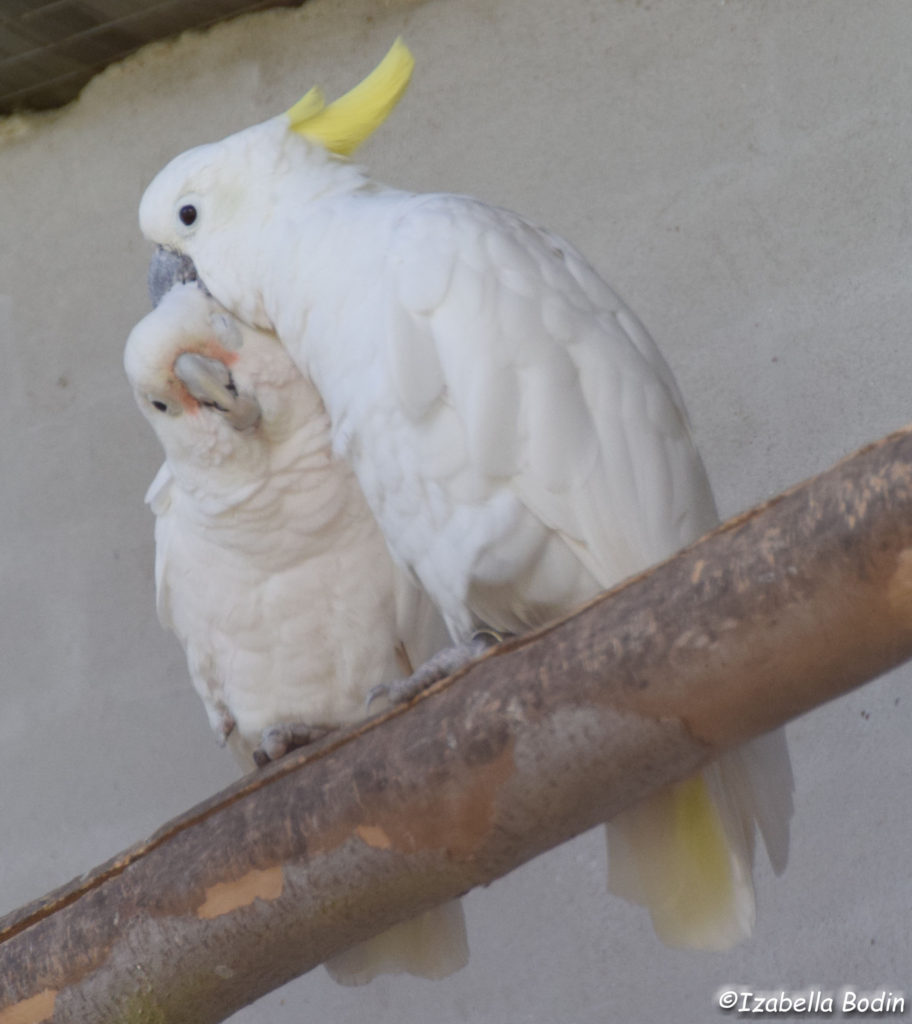Cacatua
Cockatoos are typically white, but also pink and black species are found; however only the white cockatoos are included in the Cacatua genus. The most characteristic feature of the cockatoos is the crest on top of the head; it usually lies flat on the head when the bird is relaxed, but is raised depending on the bird’s mood.
As a domestic bird cockatoos requires a lot of attention; if they are neglected they may develop mental issues e.g. picking feathers or scream very loud to attract your attention.
Note that some cockatoos tend to scream VERY LOUD when they are upset or when they lack attention! For this reason I would not recommend cockatoos as pets if you live in an apartment.
Especially the big cockatoos are very gentle domestic birds and will rarely bite – though you have to watch during the breeding season, as even the most gentle bird can become aggressive when it has to protect the nest!
In general cockatoos are very social and like to chat and play with everybody. They are very intelligent and can learn to imitate words and short sentences; they are however not as skilled talkers as Grey Parrot or Amazon parrots.
They have a very strong beak and some species are known to be very destructive – they can quickly destroy your glasses, your wrist watch, or remove buttons from your clothes if not careful (speaking from personal experience). Cockatoos love to chew at everything so their cage or aviary must therefore be made of steel or other materials they can not not easily destroy. Also give them wooden toys and branches to satisfy their need for chewing.
The white cockatoos have some white dust in the feathers – whenever they sit on your shoulder you will notice some white dust on your clothes afterwards. This is quite normal and should not give rise to turmoil. Some people may have allergies to this dust, so be aware if you or anybody in your family have allergies before you consider acquiring a cockatoo!
Their high intelligence also make them great escapists; make sure the locks on the cage are bird proof! They will study how you open the cage by pulling or twisting the lock and then they will use their beak or claws to try to open i – make sure they can not reach the lock with their claws or beak from the inside (some cages have a large metal plate around the lock to prevent this). Also some of the larger cockatoos can destroy the metal bars in the cage if they are not strong enough so don’t buy the cheapest cage you can find or you may come home to an empty cage someday!
Cockatoos are susceptible to Psittacine Beak and Feather Disease (PBFD) – be careful when buying a new bird; watch closely for signs of PBFD not only on your new bird but also the other birds as it is highly contagious! Also make sure to maintain a quarantine before introducing the new bird to the other birds in your home or aviary.
Species
 Cacatua alba
Cacatua alba
White Cockatoo
 Cacatua ducorpsii
Cacatua ducorpsii
Solomons Cockatoo
 Cacatua galerita
Cacatua galerita
Sulphur-crested Cockatoo
 Cacatua goffiniana
Cacatua goffiniana
Tanimbar Corella
 Cacatua haematuropygia
Cacatua haematuropygia
Red-vented Cockatoo
 Cacatua moluccensis
Cacatua moluccensis
Salmon-crested Cockatoo
 Cacatua ophthalmica
Cacatua ophthalmica
Blue-eyed Cockatoo
 Cacatua pastinator
Cacatua pastinator
Western Corella
 Cacatua sanguinea
Cacatua sanguinea
Little Corella
 Cacatua sulphurea
Cacatua sulphurea
Yellow-crested Cockatoo
 Cacatua tenuirostris
Cacatua tenuirostris
Long-billed Corella
Photo Credits
- Blue-eyed Cockatoo : Nik Borrow, License: Creative Commons CC BY-NC 2.0
- Little Corella : Copyright © by Murray Hubbard
- Red-vented Cockatoo : Public Domain by Vassil
